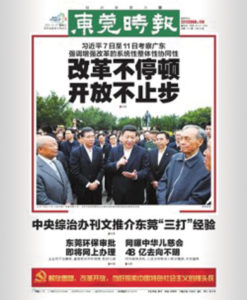From 7 to 11 December 2012, newly installed Party General Secretary Xi Jinping embarked on a ‘Southern Tour’ (nan xun 南巡), evoking an imperial tradition started by Qing-dynasty emperor Kangxi (r. 1661–1722), whose first Southern Tour took him to Suzhou and Jiangning (now Nanjing) in Jiangsu province in 1684. Xi’s trip was an explicit reference to a more recent Southern Tour. By stopping in Shenzhen, Zhuhai, Foshan and Guangzhou, he revisited the sites of Deng Xiaoping’s Southern Tour of 1992. That tour, following the military crackdown on public protest in 1989, was devised to rebut conservative elements within the Party who sought a return to a planned economy and to build consensus on expanding market-based economic reforms. It was intended to deliver the message, as described in a popular saying often misattributed to Deng himself, that ‘to get rich is glorious’ (zhifu guangrong 致富光荣). By most accounts, Xi Jinping undertook his trip with similar goals: to affirm his commitment to the further privatisation of public enterprise as well as to the continued role of foreign investment and market reform in the Chinese economy. He also emphasised the need to fight corruption within the Party.
On 11 July 2013, Xi visited Xibaipo, Hebei province, a place symbolising the Communist Party’s pre-1978 leftist ideals. Xibaipo was the final base of the Red Army before it occupied the former imperial capital Beijing in late 1948. It was also where Mao Zedong finalised the process of ‘land reform’ (the often violently enforced redistribution of land previously held by wealthy, or relatively wealthy landholders to the peasantry) by issuing his ‘Principles of Chinese Land Law’ (Zhongguo tudifa dagang 中国土地法大纲).
Rebuilt after flooding during construction of the Gangnan Reservoir (Gangnan shuiku 岗南水库), Xibaipo is now a ‘Red holy site’ (hongse shengdi 红色圣地), a popular destination for ‘Red tourism’ (hongse lüyou 红色旅游). Here, Xi gave a speech declaring ‘we must never allow the Party to change its essence nor allow the Red of our mountains and lakes to fade’ (shi womende dang yongyuan bu bianzhi, womende hongse jiangshan yongyuan bu bianse 使我们的党永远不变质、我们的红色江山永远不变色).



